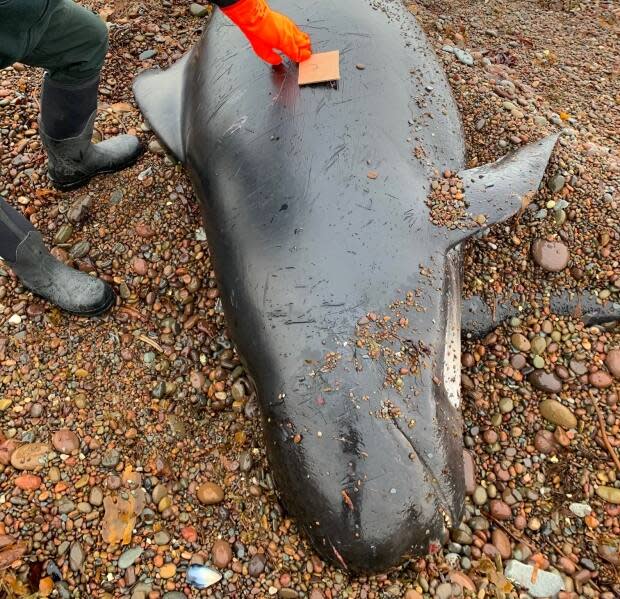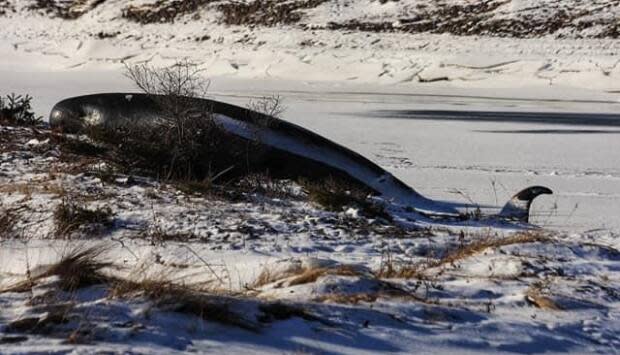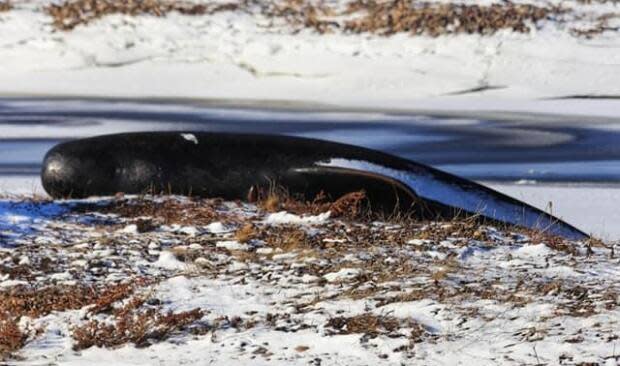DFO investigating 15 dead pilot whales found on Port au Port peninsula
The Department of Fisheries and Oceans has launched an investigation into 15 stranded pilot whales whose carcasses were found on the Port au Port peninsula in December.
Federal authorities were informed of the stranded whales on Dec. 9 and sent a team of fisheries officers to Three Rock Cove to investigate how the group of black, bulbous-headed cetaceans could have died.
"In the photographs that I have of these whales, they looked like they're in in good shape," said DFO marine mammal expert Jack Lawson in a recent interview. "They weren't starving, they weren't thin. There's no evidence of net marks on them and there's no evidence of sort of a wounding process [from striking a ship]."

"It looks like these animals may have been pursuing food or perhaps got confused," he said, adding that DFO's probe into the incident continues.
"They're known worldwide for being a species that strands. Often it's thought to be that they're chasing prey and end up in shallower waters and get stranded that way.... It may be that perhaps the leader of the group got confused or an animal was ill or something, and they all followed that lead animal on shore."
Lawson said pilot whales are extremely social animals that travel in pods that can reach hundreds of members.
He said the whales, which can reach 2,300 kilograms and seven metres in length, are becoming less common off the coast of Newfoundland, and a group stranding like the one seen in Three Rock Cove is relatively rare. But he said a similar incident, with about 60 stranded pilot whales, did occur on the island's south coast in the 1970s.

3 carcasses remain near community
Only three pilot whale carcasses are still on the beach in Three Rock Cove. During a recent storm, most of the whales were washed out to sea or covered with beach rocks, Lawson said.
But some residents of the community said that while many of the bodies were pulled back in the ocean, three were pushed away from the water and are now just a few metres from the main road.
"We had a lot of wind, a lot of very strong waves," resident Dwight Cornect told Radio-Canada in an interview last week. "The Mainland, Three Rock Cove area can often have 100, 120, 140 km/h winds coming off the ocean."

"I'd say these whales could be pushed closer to [the road]. Who knows what could happen?"
Cornect said he wants the federal or provincial government to step in and remove the whales, which he fears will be left to rot on the beach.
"It's embarrassing for people in the area. You can see the carcasses," he said. "If it were a moose, they'd be here after even two hours to remove the carcass. For a whale, what's the difference?"
Who's responsible for cleanup?
In a statement, DFO said it "does not have a role in the disposal of stranded, dead whales" in Three Rock Cove.
"If a dead whale is beached within a municipality, the municipality is responsible; on Crown land, the government of N.L. is responsible; and, within the boundaries of a national park, Parks Canada is responsible."
Cornect said he's contacted Tony Wakeham, the MHA for Stephenville-Port au Port, to inform him of the situation. In an email, Wakeham said he's been in contact with DFO to discuss the situation.
For now, Lawson said, there's no need to remove the carcasses.
"Generally, you know, within a short period of time, these animals, because they're relatively small, say, compared to the blue whales that washed up on the west coast, they'll tend to rot fairly quickly and get scavenged by gulls and so on and won't last too long," he said.
"The degradation process happens relatively quickly for these small whales and soon they'll just be bones on the beach or washed away. So that's why we won't necessarily rush to try and move an animal like this," he said, adding he doesn't believe the whales present a risk to safety.

